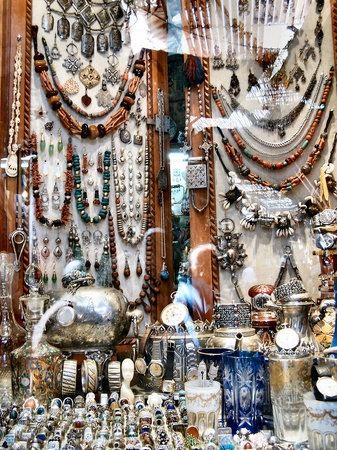New Medina of Casablanca
 HERITAGE Three names for one city…The origin of the city of Casablanca is very vague, the history of the white city is a reflection of it’s personality; a mysterious place with rich ethnic and cultural mixing and a rapid economic success.
HERITAGE Three names for one city…The origin of the city of Casablanca is very vague, the history of the white city is a reflection of it’s personality; a mysterious place with rich ethnic and cultural mixing and a rapid economic success.Anfa
Some say Anfa was founded by the Romans, others by the Phoenicians or Berbers. One thing is certain, the spelling ‘Anfa’ has rarely been the same : Niffe, Anafe, Anife, Anafa or Nafe. The origin could come from the Arabic word ‘Anf’, which means nose, or the Berber word ‘Anfa’ meaning hill.
Several dynasties came and went from the 12th to 15th centuries, until a brief period when it was inhabited by pirates. To avenge the damage done by those from Anfa, the Portugese decided to destroy the city. Anfa experienced three centuries of near abandonment, until the arrival of the Alawite Sultan Sidi Mohamed Ben Abdellah.
Dar El Beida
 The Sultan decided to restore the city to its former glory. He moved there and built a mosque, a hammam, madrasa and other institutions essential to ensure the smooth running of a city. The city was then re-named ‘Dar El Beida’, eager to make a port of international importance, he built a fortified stronghold and walls (the scala). After opening the port to Europe in 1830, trade with Spain became regular. That is how the city got the name “ Casa Blanca”, translation of Dar El Beida.
The Sultan decided to restore the city to its former glory. He moved there and built a mosque, a hammam, madrasa and other institutions essential to ensure the smooth running of a city. The city was then re-named ‘Dar El Beida’, eager to make a port of international importance, he built a fortified stronghold and walls (the scala). After opening the port to Europe in 1830, trade with Spain became regular. That is how the city got the name “ Casa Blanca”, translation of Dar El Beida.Casablanca
The city became an important port on an international level, it also became an important economic centre in charge of export, import and manufacturing. The population grew significantly, with rural traders from all over Morocco, settling in the city. It is now the economic capital of the country!
morocco culture,moroccan food,morocco food,moroccan cuisine,morocco beaches,moroccan meal,beaches in morocco,moroccan culture,hercules cave,hercules cave morocco
Comments